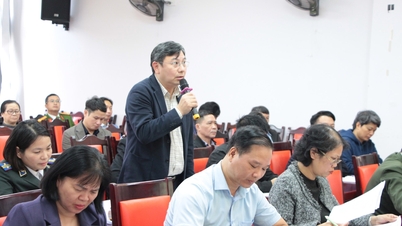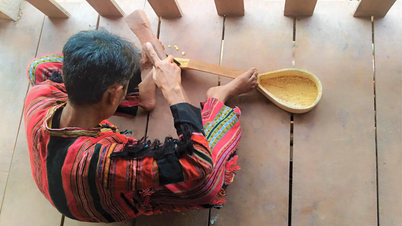
On the afternoon of November 8, discussing the investment policy for the National Target Program on Drug Prevention and Control until 2030, delegates agreed with the necessity of issuing the Program due to the harmful effects of drugs on society and people's health.
Regarding capital to implement the Program, the Government is proposing a total implementation capital of nearly 22,500 billion VND.
According to delegate Cao Thi Xuan ( Thanh Hoa ), the capital scale, if compared with the targets set by the national target programs being implemented, is still quite modest.
Delegates suggested paying attention to the mechanism for allocating and arranging counterpart funds for key drug-related localities. At the same time, the Government needs to continue to carefully review to avoid duplication with national target programs in terms of scope, objects, and beneficiary areas.
Concerned about the allocation of central budget capital to support the implementation of the Program, delegate Chu Thi Hong Thai (Lang Son) agreed with the principle of the Central Government providing financial support to localities that have not yet balanced their budgets.
However, the delegate suggested that the drafting agency should consider proposing to the Government to regulate the proportion of counterpart capital for localities that have not balanced their budgets, at a reasonable rate so that localities can meet the demand.
In reality, localities are currently implementing 3 national target programs and there will be 2 more programs coming soon; local budgets have tried very hard, especially the National Target Program on New Rural Construction which requires a 1:1 matching ratio, making it very difficult for localities receiving up to 80% of the budget, such as Lang Son province, to arrange.
Meanwhile, Lang Son is a border province with many border gates and important areas for security, order, and drug crimes, so it needs resources to be able to implement the program's projects.
Many delegates expressed concerns about the feasibility of the goals and targets set in the Program.
Delegate Pham Hung Thang (Ha Nam) gave an example: for the group of supply reduction targets, some targets strive to reach 100% such as complex drug hotspots, risk points for drug retailers, strive to be discovered and destroyed 100%. According to the delegate, it is very difficult for this target to reach the maximum level of 100%.

Delegate Tran Thi Nhi Ha (Hanoi) said that the goal of having at least 80% of commune health stations qualified to determine drug addiction status is difficult to achieve because the ability to organize implementation at the grassroots level is still limited.
“We set specific targets and goals; however, they must comply with current legal regulations and create favorable conditions for localities to implement,” the delegate recommended.
Discussing in groups about the draft Law on amending and supplementing a number of articles of the Law on Advertising, delegates pointed out that there are currently many violations of advertising, especially advertising that does not match the quality of the product, leading to misunderstandings for consumers, making the rights of consumers not guaranteed. Therefore, delegates proposed to stipulate stronger sanctions for violations of advertising.
Delegates suggested that there should be more transparency in advertising activities, especially advertising in newspapers; clearly defining regular news articles and sponsored news articles for advertising purposes.
According to delegates, increasing advertising space on newspapers and magazines will help press agencies increase revenue and better implement the financial autonomy mechanism. However, there is a need for specific regulations on advertising positions for different types of newspapers and magazines.
Some opinions suggested assessing the policy impact to clarify the basis to increase the persuasiveness of the amendment to increase advertising time on pay TV channels from 5% to 10%./.


![[Photo] General Secretary To Lam receives the Director of the Academy of Public Administration and National Economy under the President of the Russian Federation](/_next/image?url=https%3A%2F%2Fvphoto.vietnam.vn%2Fthumb%2F1200x675%2Fvietnam%2Fresource%2FIMAGE%2F2025%2F12%2F08%2F1765200203892_a1-bnd-0933-4198-jpg.webp&w=3840&q=75)








































































































Comment (0)